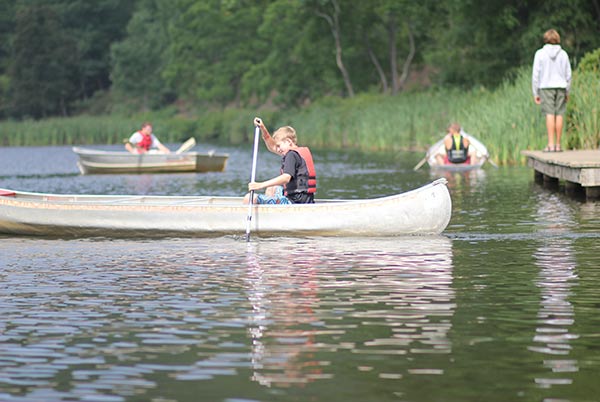
Plan Ahead for Summer Camp
TIPS FOR YOUR CHILD TO HAVE A GREAT CAMP EXPERIENCE
Summer camp. The words are enough to instill panic in parents of celiac kids.
In fact, after our son Ryan was diagnosed with celiac 12 years ago, I remember thinking he’d probably never be able to attend summer camp. I fi gured it would be nearly impossible to keep him food-safe.
Years later, we heard about Camp Celiac in Rhode Island.
It started as a weekend camp in 2000 and soon evolved into a fi ve-night traditional sleepaway camp. The first of its kind, it offered a safe environment for kids following medically necessary gluten-free diets.
Once Ryan was old enough to attend Camp Celiac (they take kids ages 8 to 16), we signed him up. I volunteered to fill one of the much-needed parent counselor slots during the week. This was partly altruistic and partly because my husband and I felt a bit nervous sending our 8-year-old off to a sleepaway camp for the fi rst time.
Fast forward to the present, and I can tell you this has become the highlight of Ryan’s summer. As a parent counselor for the past six seasons, it’s also been rewarding for me to observe “kids being kids” – not worrying about whether they can or can’t eat something, not wondering if they’ll get sick, not feeling different.
The best part is, more camps like this have sprung up all over the country. I showcase a handful here, and you can access more details, plus the full listing, on the
Camps page within the Resources section of my website, glutenfreetravelsite.com.
Note: Our Camps page will continue to be updated as new information becomes available. Many of these camps fi ll up quickly, so it’s never too early to start looking into your options.
All of these camps have instituted special procedures to reduce the risk of cross contamination and safely serve their gluten-free campers. Some even maintain 100 percent gluten-free kitchens for the week or have separate kitchens for preparing gluten-free meals for those who need them.
But what if none of these camps is convenient for you? Or what if your child wants to attend another camp with his or her neighborhood friends? Can it be done?
We’ve found that, as long as you’re willing to do a lot of research and preparation, there’s a way to make most camps work.
Both our boys are involved in Boy Scouts, and summer camp is a big part of their troop’s program. It’s when they get to participate in a lot of outdoor activities as well as work on merit badges and rank advancements. We knew early on that if Ryan was going to continue in Boy Scouts, we had to fi nd a way for him to attend summer camp.
He’s now been to four different scout camps in as many years. Each lasted from three to six nights. All of them worked out well (plenty to eat and no getting sick), but did require a good bit of planning and communication with the camp. Here are the different scenarios we’ve encountered.
A FULL PACK (a week’s worth of meals)
I always start with a phone call to the camp as early as February. Once I’m able to get in touch with the person in charge of dining services, I explain our son’s need for a gluten-free diet. These days, most people know what that entails, which is why they typically suggest that Ryan bring all his own food for the week. With so many campers to feed, it’s often beyond their ability to keep kids like Ryan safe, even if some of the food is gluten-free by nature.
Helpful tips if you land yourself in this situation:
- Verify your child will be able to store frozen and refrigerated food properly (these camps typically have full walk-in refrigerators and freezers). Find out if he or she will have access to a small area of the kitchen to prepare meals or if a well-trained member of the kitchen staff will be able to do so. For sanitary and safety reasons, some camps won’t allow campers in the kitchen.
- About a month before camp, request a menu for the week so you can help your child pack food that is similar to what his or her friends will be eating.
- Keep things simple. Your child won’t want to spend too much time or effort preparing meals (and there may be limited space). Also, there may not be access to a safe toaster or the use of an oven, although microwaves should always be available. Send cereal, yogurt, hardboiled eggs, sausage, granola, muffi ns, and fruit for breakfast; sandwich ingredients for lunch; and microwavable meals (homemade or storebought) for dinner.
- Don’t forget to pack treats. Desserts will almost never be gluten-free at camp (unless they’re serving a brand of ice cream that you can verify is gluten-free).
- Send along a small cutting board, knife (if age appropriate), sponge, dishwashing soap, and a dishtowel. This ensures your child will have everything necessary to prepare meals and do simple clean-up.
- Try to fi t everything in one cooler (on wheels!). You never know how far your child may need to carry this cooler upon arrival at camp.
A PARTIAL PACK (key gluten-free items to supplement camp food)
This past year, after our boys’ troop decided to attend a new summer camp out of their council area, I contacted the director of dining services to explain that Ryan would be bringing all his own food, just as he had over the past few years.
What I assumed would be a fairly straightforward discussion about whether they could accommodate his needs took a different turn. Because the kitchen was small, the dining director wasn’t comfortable with kids coming in the kitchen to prepare their own meals. However, he insisted that he had safely served meals to gluten-free kids for many years with no problem and could therefore handle Ryan’s needs.
While I was a bit skeptical at rst, I listened to him with an open mind. After sending me the menu, he proceeded to tell me exactly what ingredients were in each menu item, the brands of food purchased, and the cooking methods. He also explained that daily meetings with his kitchen staff allowed him the opportunity to communicate the needs of campers with restricted diets before each meal.
After our discussions and some further research on my part, I agreed that Ryan would be in good hands. The only items he’d need to bring would be gluten-free bread products like hamburger buns, sandwich bread, and dinner rolls. They even stocked (and knew how to prepare) gluten-free pizza and pasta. To make sure both Ryan and the kitchen staff kept everything straight, I typed up a one-page synopsis of the week’s meals, highlighting in red where substitutions would need to be made. We packed this right inside his cooler.
CAMPING TRIPS
Scout camping trips are a third scenario we’ve encountered over the years. Surprisingly, these trips can be among the more manageable situations, since the scouts plan and shop for their own food.
Fortunately, our son is comfortable articulating his needs to his fellow scouts. He makes sure he’s involved in the menu planning so he can request meals that are easy to make gluten-free (chili, steak, grilled chicken) or easy to modify (burgers, for which he can pack his own gluten-free bun). Even when it’s not Ryan’s turn to do the shopping, he makes sure to communicate to his fellow scouts which brands are gluten-free for things like sausage, deli meat, yogurt, and snack foods. While he may still have to supplement a few items, he’s able to keep it to a minimum. The best part is that he doesn’t have to feel “different.” He’s eating the same thing as everyone else.
While sending your child off to camp can be a leap of faith, advance preparation and good communication help ensure success and help your gluten-free child learn to take more responsibility for his or her own safe dining. It’s a good thing, because these kids will all be off to college before we know it!
SOME GF CAMPS TO CONSIDER
For our full listing of GF summer camps visit: glutenfreetravelsite.com/glutenfreecamps.php
CAMP CELIAC, North Scituate, RI
CAMP EAGLE HILL, Elizaville, NY
CAMP WEEKANEATIT, Warm Springs, GA
THE GREAT GLUTEN ESCAPE, Gilmer, TX
FREE TO BE CAMP AT CAMP WESTMINSTER, Roscommon, MI
GLUTEN FREE FUN CAMP, Annandale, MN
CAMP CELIAC, Livermore, CA
GIG KIDS CAMP – CAMP SEALTH, Vashon, WA
 ABOUT THE AUTHOR:
ABOUT THE AUTHOR:
Karen Broussard publishes glutenfreetravelsite.com and the free DINE GLUTEN FREE mobile app. Both contain thousands of GF dining and travel reviews from around the world. Karen is also the publisher of the Gluten Free Travel Blog and two e-books available on Amazon: Gluten-Free in London and Gluten-Free in Italy.




